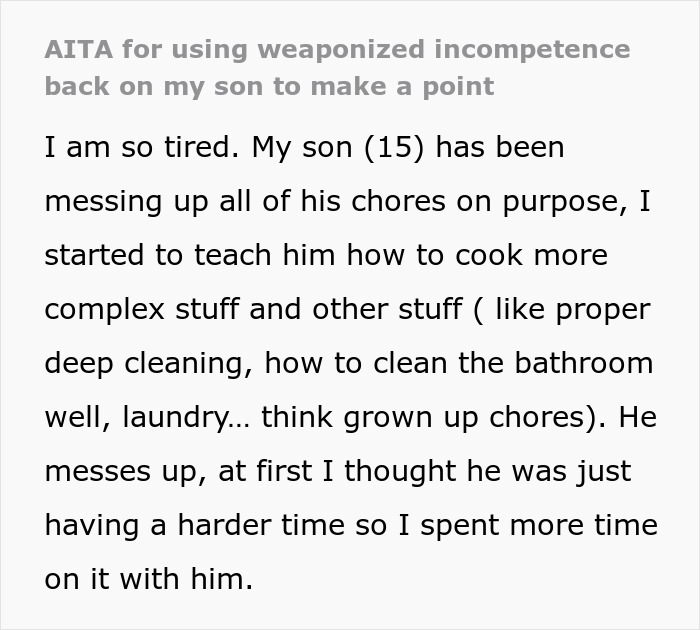Redditor Odd_Hat_2030 even started wondering if there was something wrong with her son, who just couldn’t get the hang of simple chores. After finding out that he did it on purpose, she used similar logic to get back at him. Scroll down to find the full story and a conversation with parenting and family coaches Rachael Fritz and Susan Morley, who kindly agreed to disclose a few tips on how to get kids into choring.
Convincing children to do chores can be a true brain teaser for parents
Share icon Image credits: ADDICTIVE_STOCK/Envato (not the actual photo)
This mom even started wondering if there was something wrong with her son, who couldn’t do them
Share icon Image credits: LightFieldStudios/Envato (not the actual photo)
Image credits: Odd_Hat_2030
“Consider what children already enjoy doing and take it slow”
Share icon Image credits: ADDICTIVE_STOCK/Envato (not the actual photo) Parenting and family coach Susan Morley tells Bored Panda that “Chores are essential for raising a child into a capable, independent, successful, and happy adult. When children are required to do chores, they also feel like they are an essential part of the family because they feel needed.” Rachael Fritz, the founder and principal parenting coach of Parenting on Mars, agrees that giving children the opportunity to contribute is a wonderful way to teach them responsibility. However, it’s important to make sure that parent’s expectations are developmentally and age-appropriate. “Consider what children already enjoy doing and take it slow. We have a laundry shoot at my house, and my two little boys (6 YO and 3 YO) love tossing their laundry down the shoot, running to the basement, and then throwing it in the washing machine. Every morning, I ask if they’ve done their laundry, and they love the task!” When asked why so many parents find it challenging to get their children to do chores, Morley explains that it’s because they don’t allocate more time for it. “Most parents would love for their children to spend 20 minutes a day doing household chores (including helping with planning and preparing meals, pet care, yard work, etc.). But parents today are so busy that they end up telling their kids to do chores without ever having taught children HOW to do them. It takes time and planning to teach children how to do chores. It can feel like an overwhelming task, but in reality, it doesn’t take very long at all.” Meanwhile, Fritz believes that oftentimes parents ask for too much at once. “Asking a child to “clean their room” can feel like such a daunting task to a little one. Getting really specific can help. Instead, try, “Please put your books on the bookshelf.” Then, as they get older, add more tasks,” she advises.
“Providing authentic praise for a job well executed is important”
Share icon Image credits: prostooleh/Envato (not the actual photo) Fritz mentions that one mistake preventing parents from getting kids to do household chores is not getting involved themselves. “Oftentimes, parents ask me why their kids clean up after themselves at school but not at home. At school, everyone participates at the same time. It’s like a flock of birds. If the entire family is engaging in a task like cleaning up dinner, this makes it a lot easier for children to participate and learn.” “So how do I motivate my child to get involved with the housework?” the restless parents might be asking. Fritz recommends keeping the stakes low and showing appreciation when they participate, even if it’s small. “Say something like, “I noticed how you put your plate in the sink after dinner. Thank you for helping the family in this way.” This is a much better approach than “No dessert until you clean up.” We want to foster a sense of community and responsibility, not fear and punishment.” Meanwhile, Morley recommends taking the time to teach the kids how to properly do housework. After they learn, giving them a bit of freedom without micromanagement can motivate them even more, as the child feels empowered and proud of the contribution they’re making to the house. “Of course, providing authentic praise for a job well executed is important,” she adds. “Parents should be careful to praise the effort rather than the result, “Wow, you worked so hard to make that sink shine. Thank you.”
The author provided more information in the comments
Share icon Share icon Share icon Share icon Share icon
Readers had a lot of mixed opinions, some saying that the mother’s behavior was justified
Share icon Share icon Share icon Share icon Share icon Share icon Share icon Share icon Share icon Share icon Share icon Share icon Share icon Share icon Share icon
Others believed that her weaponized incompetence was wrong
Share icon Share icon Share icon Share icon Share icon
Meanwhile, some saw both sides as wrong
Share icon Share icon Share icon Anyone can write on Bored Panda. Start writing! Follow Bored Panda on Google News! Follow us on Flipboard.com/@boredpanda!





































